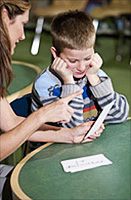What are related services for students with disabilities and how are they provided?
Page 2: Identifying Related Services
 As you have learned, related services and special education services go hand-in-hand, providing students with the extra supports and services they need if they are to fully benefit from their individualized educational program or meet their individually designed learning goals. Before students can receive related services, though, they must be identified through the special education eligibility process as having a disability. Once a referral to special education is made, educators and professionals from other disciplines, such as speech-language pathology services or psychological services, form a multidisciplinary team to assess the students’ evaluation for special education and related services. This process specifically assesses the identified or suspected areas of concern and is individualized for that student. It includes all aspects of the student’s performance, including speech or communication abilities, social-emotional skills, fine- or gross-motor skills, general intelligence, and behavior.
As you have learned, related services and special education services go hand-in-hand, providing students with the extra supports and services they need if they are to fully benefit from their individualized educational program or meet their individually designed learning goals. Before students can receive related services, though, they must be identified through the special education eligibility process as having a disability. Once a referral to special education is made, educators and professionals from other disciplines, such as speech-language pathology services or psychological services, form a multidisciplinary team to assess the students’ evaluation for special education and related services. This process specifically assesses the identified or suspected areas of concern and is individualized for that student. It includes all aspects of the student’s performance, including speech or communication abilities, social-emotional skills, fine- or gross-motor skills, general intelligence, and behavior.
multidisciplinary team
A team of teachers, educational professionals (e.g., related services personnel, school psychologist), administrators, specialists, and parents or guardians who assess the individual needs of students to determine eligibility for special education and develop individualized education programs (IEP); often called IEP teams.
For more information on the pre-referral process for identifying a student with a disability, view the following IRIS Module:
 Once the evaluation is complete, the multidisciplinary team reviews and discusses the results to determine whether the student is eligible for special education and related services. If the team determines that the student is eligible, they develop the individualized educational goals and objectives for the student, an IEP. During this meeting, related services providers might also share their expertise and suggest how a specific service or combination of services might help a student achieve his or her individual goals. In regards to related services, each team must determine:
Once the evaluation is complete, the multidisciplinary team reviews and discusses the results to determine whether the student is eligible for special education and related services. If the team determines that the student is eligible, they develop the individualized educational goals and objectives for the student, an IEP. During this meeting, related services providers might also share their expertise and suggest how a specific service or combination of services might help a student achieve his or her individual goals. In regards to related services, each team must determine:
direct or indirect service
direct service – Service provided directly to the student by the therapist or other professional (e.g., a social worker or counselor). Such provision can be in or out of the classroom but should always be in the least-restrictive environment as determined by the IEP team.
indirect service – Service provided indirectly to the student. The therapist provides consultative or collaborative services to educators or families. Examples of indirect services include showing the teacher a technique to use with a student or demonstrating equipment use.
- How the service will be delivered (i.e., will it be a direct or indirect service)
- The frequency of the service (e.g., once a week, twice a month)
- The duration of the service (e.g., 30 minutes per week, 120 minutes per month)
- Where the service will be provided (e.g., in the general education classroom, resource room, or other setting)
- When the service will begin (i.e., its start and end dates)
This information is documented on the IEP form.
| Type of Service | Service Delivery | Provider Title | Frequency | Duration | Location | Beginning/ Ending Date |
|---|---|---|---|---|---|---|
| Physical Therapy | Direct service/ Indirect service (Consultative) | Physical Therapist | 4 times/ month | 2 hrs. per month (1/2 hour per session) | general education classroom, band classroom | Oct. 17, xx-May 16, xx |
| Speech-Language Pathology Services | Indirect service (Consultative) | Speech-Language Pathologist | 2 times/ month | 1 hr. | general education classroom, lunchroom | Oct 17, xx-May 16, xx |
Related service providers bring multidisciplinary perspectives that contribute to discussions about the services required by the target student. They also help ensure that the related services are integrated into the students’ educational program. Here are some considerations for the team to think about when integrating services into students’ programs:
- Students’ daily schedules
- Most appropriate times to provide the service to help meet the goals
- Naturally occurring opportunities (e.g., provide PT during regular recess or physical education time)
For Your Information
In some cases, a student who has a disability may not require special education services, therefore not qualifying as a student with a disability under IDEA ’04. This student may still qualify for related services under Section 504 if the student’s disability limits his or her ability to learn or carry out other major life activities such as walking, seeing, hearing, breathing, or communicating.
Section 504 of the Rehabilitation Act of 1973
Federal law that outlines basic civil rights for people with disabilities.